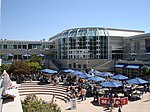RIMAC
1995 establishments in CaliforniaBasketball venues in CaliforniaCollege basketball venues in the United StatesCollege soccer venues in CaliforniaConvention centers in California ... and 5 more
Indoor arenas in CaliforniaSports venues completed in 1995Sports venues in San DiegoUC San Diego Tritons basketballUniversity of California, San Diego

The Recreation, Intramural, and Athletic Complex (RIMAC, REE-mak) is a sports complex at the University of California San Diego comprising an arena, a weight room and various other event and athletic facilities. It is one of the largest college athletic facilities in the country. RIMAC Arena is the home arena of the UC San Diego Tritons men's and women's basketball and volleyball teams, and Triton Soccer Stadium on the adjacent RIMAC Field hosts Triton men's and women's soccer matches.
Excerpt from the Wikipedia article RIMAC (License: CC BY-SA 3.0, Authors, Images).RIMAC
Hopkins Drive, San Diego Torrey Pines
Geographical coordinates (GPS) Address External links Nearby Places Show on map
Geographical coordinates (GPS)
| Latitude | Longitude |
|---|---|
| N 32.885278 ° | E -117.239223 ° |
Address
RIMAC Arena
Hopkins Drive
92093 San Diego, Torrey Pines
California, United States
Open on Google Maps



